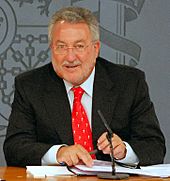Bernat Soria facts for kids
Quick facts for kids
Bernat Soria
|
|
|---|---|
 |
|
| Minister of Health and Consumer Affairs | |
| In office 9 July 2007 – 8 April 2009 |
|
| Prime Minister | José Luis Rodríguez Zapatero |
| Preceded by | Elena Salgado |
| Succeeded by | Trinidad Jiménez |
| Member of the Congress of Deputies | |
| In office 1 April 2008 – 7 November 2009 |
|
| Constituency | Alicante |
| Personal details | |
| Born | 7 May 1951 Carlet, Spain |
| Political party | PSOE |
| Alma mater | University of Valencia |
| Occupation | Scientist and politician |
Bernat Soria Escoms, born on May 7, 1951, is a well-known Spanish scientist. He also worked in politics. From 2007 to 2009, he was Spain's Minister of Health. He was part of the Spanish Socialist Workers' Party.
Contents
Bernat Soria's Early Life and Education
Bernat Soria studied at the University of Valencia in Spain. He earned degrees in medicine and a PhD. After his studies, he continued his research abroad. He worked at the Max Planck Institute for Biophysical Chemistry. He also spent time at the University of East Anglia in the UK. There, he was a Senior Research Associate in the School of Biological Sciences.
What is a Postdoctoral Study?
A postdoctoral study is advanced research. It is done after someone earns their PhD. It helps scientists gain more experience. They often work on specific projects.
Bernat Soria's Scientific Career
Bernat Soria has held many important roles in science. From 2001 to 2005, he was a Visiting Professor. This was at the National University of Singapore. He also led important scientific groups. He was President of the European Stem Cell Network. He also led the European Association of Biophysical Societies (EBSA). This was from 2000 to 2004.
Leadership in Spanish Scientific Societies
He has also been in charge of several Spanish societies. These include the Spanish Diabetes Society (SED). He also led its Foundation (FSED). He was President of the Spanish Biophysical Society (SBE). He also led the Spanish Society of Physiological Sciences (SECF). These roles show his dedication to science.
Research and Publications
Bernat Soria has written many research articles. He has published over 160 articles. These papers are found in scientific databases. His work has been cited over 11,000 times. This means other scientists have used his research. His main areas of study include stem cells and diabetes. He also studies the biophysics of pancreatic islets.
Pioneering Stem Cell Research
He was a leader in using stem cells. He worked on turning stem cells into cells that make insulin. Insulin is important for people with diabetes. His paper in the journal Diabetes (2000) is very famous. It has been cited over 1,200 times. This paper is considered "Highly Cited."
Current Work and Recognitions
Bernat Soria continues his scientific work today. He is a researcher at the Institute of Bioengineering. He also works at the Health Research Institute (ISABIAL). This institute is part of the Alicante University Hospital. He also leads the Andalusian Foundation for Research and Development (FAID).
Awards and Honors
He has received many awards for his work. He got the Prize and Gold Medal from the Royal National Academy of Medicine. He also received the Alberto Sols Prize. This award is for research in health sciences. He was given the Galien International Prize. He also received the Andalusian Medal.
In 2013, he became a Doctor Honoris Causa. This is an honorary degree. It was given by the Scientific Universities of the South. In 2014, he received the same honor. This was from the National Mayor of San Marcos, Lima. In 2015, he became an Honorary Fellow. This was at the Royal College of Physicians of the United Kingdom. He was the first Spanish person to receive this honor.
See also
 In Spanish: Bernat Soria para niños
In Spanish: Bernat Soria para niños
 | Kyle Baker |
 | Joseph Yoakum |
 | Laura Wheeler Waring |
 | Henry Ossawa Tanner |

